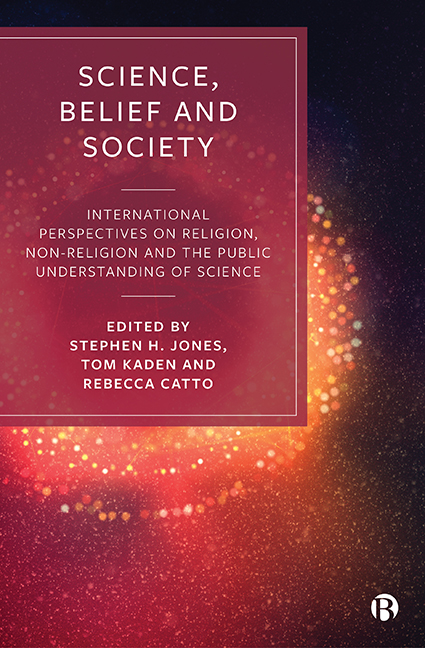 Science, Belief and Society
Science, Belief and Society Book contents
- Frontmatter
- Contents
- List of Figures and Tables
- Notes on Contributors
- Editors’ Acknowledgement
- Foreword
- Editors’ Introduction: Science, Belief and the Sociological Tradition
- PART I Methodological Challenges in the Study of Science and Belief
- PART II Belief in the Study of Science and Technology
- PART III Science, Culture and Non-religion
- PART IV Religion, Conflict and Moderation
- Conclusion: Future Directions in the Sociological Study of Science and Belief
- Index
4 - Researching Clergy Attitudes towards Science: A Reflective Account of Key Methodological Challenges
Published online by Cambridge University Press: 27 April 2022
- Frontmatter
- Contents
- List of Figures and Tables
- Notes on Contributors
- Editors’ Acknowledgement
- Foreword
- Editors’ Introduction: Science, Belief and the Sociological Tradition
- PART I Methodological Challenges in the Study of Science and Belief
- PART II Belief in the Study of Science and Technology
- PART III Science, Culture and Non-religion
- PART IV Religion, Conflict and Moderation
- Conclusion: Future Directions in the Sociological Study of Science and Belief
- Index
Summary
Introduction
As a sociologist carrying out research on clergy attitudes towards science, one of my favourite tales concerns a senior church leader who volunteered to be interviewed. When we met up, I thanked him for agreeing to speak to me about Christianity and science. At this point, the colour began to drain from his face: ‘Oh dear!’, he said, ‘I thought you were here to talk to me about Christianity and silence !’. While this is a light-hearted story, the statement that followed gave me a real insight into one of the key challenges of doing research in this area. The interviewee went on to say: ‘If I had realized you were interviewing me about science, I probably wouldn't have agreed to do it’. When I probed him further, he replied that not being from a science background would have put him off coming forward to be interviewed. I had suspected, anecdotally at least, that this might be the case since science is often perceived to be a specialized subject that only an ‘expert’ can comment on. As Katherine Mathieson (2017), chief executive of the British Science Association, observes: ‘[S]cience needs to be taken out of its cultural ghetto…. [I]t's seen as the realm of professionals and experts’. Mathieson goes on to say that science is guiltier of this than other academic/societal spheres such as business, arts, politics or sports. In the case of the church leaders in my research, this apprehension around science also fed into a general mistrust of the media, with many of my interviewees citing their own experiences of having taken part in intentionally divisive radio or TV panels.
The aim of this chapter is to outline some methodological reflections derived from my own experiences of carrying out research on science and Christianity. I want to argue that being more reflexive about one's own methodological challenges can lead to the refinement of research methods and enable greater understanding of research subjects and the social world. This is particularly needed in the case of science and religion research, which is relatively undeveloped. Indeed, socialscientific research on this topic has only recently begun to flourish in the UK and Europe; this collection thus contributes to an underresearched field.
- Type
- Chapter
- Information
- Science, Belief and SocietyInternational Perspectives on Religion, Non-Religion and the Public Understanding of Science, pp. 79 - 100Publisher: Bristol University PressPrint publication year: 2019
